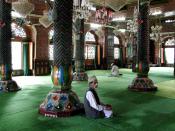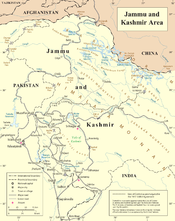UN Recommendation for the Resolution of the Conflict in Jammu and Kashmir
The modern day dispute over Jammu and Kashmir was spawned in the wake of British India's 1947 independence and the subsequent partitioning of the subcontinent into two states, Hindu India and Muslim Pakistan. India and Pakistan both claim that Kashmir rightfully belongs in their possession. For nearly half a century this territorial disagreement has been characterized by terrorism, violence, and double occupation of the Kashmiri state. Both India and Pakistan have become entrenched in uncompromising ideologies in their quests for hegemony in Kashmir. Presently, the struggle has stagnated at the line of control (LOC), with very little constructive progress towards peace being made in the last decade. The United Nations has been involved in this conflict in varying capacities since its post-World War II outbreak. Recently, the UN has been called upon to draft a proposal for resolution of this dispute based of upon a framework of international law, reasonable expectations, and the best interests of the people of Kashmir.
Upon the withdrawal of the British Empire from the Indian subcontinent, arrangements were made to partition the colony into two states, one primarily Muslim and one primarily Hindu. British plans for the partition were drawn up hastily to expedite the process of extraction from the colony. As the British withdrew the status of the colony and the princely estates was determined by
the provisions of the Indian Independence Act. As Brian Farrell explains in his article:
The Indian Independence Act provided that the Crown's paramountcy lapsed and all powers returned to the individual states...without British forces available for their defense, independence was not a real option for the princely states, many of which were quite small. The states were encouraged by then-Viceroy Lord Mountbatten to accede to one...


